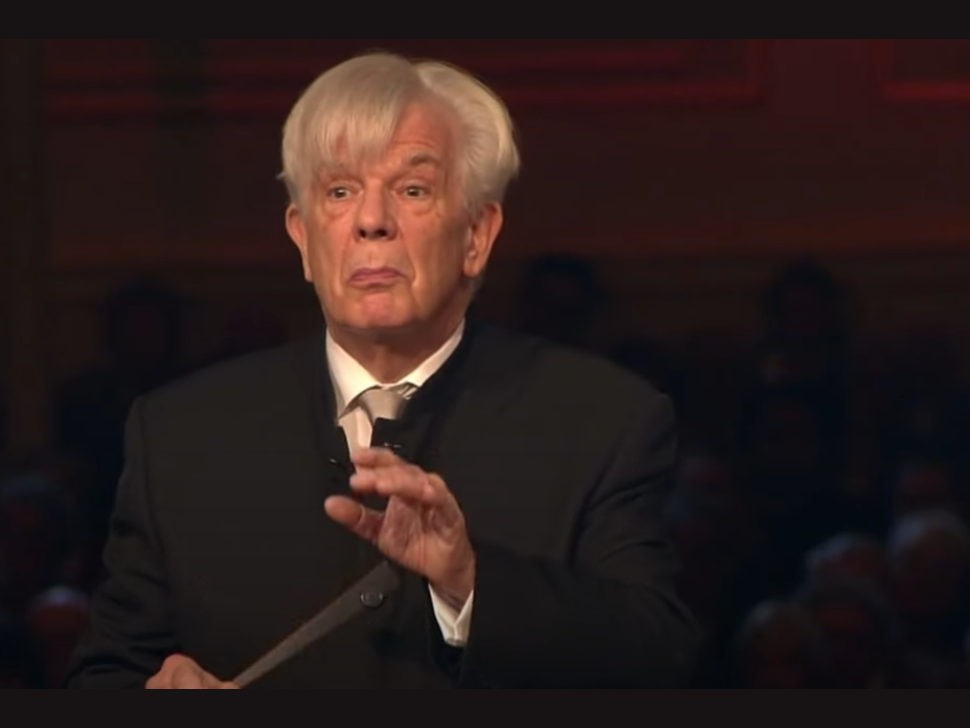Christoph von Dohnányi, the German conductor whose 18-year tenure at the helm of the Cleveland Orchestra transformed it into one of the world’s most admired ensembles, has died in Munich. He was 95, just two days shy of his 96th birthday.
Dohnányi’s relationship with the Cleveland Orchestra, where he served as music director from 1984 to 2002, redefined the ensemble’s international reputation. His leadership was marked by adventurous programming, more than a hundred recordings, high-profile residencies in Europe, and the orchestra’s historic debut in China. It was during this period that Time magazine famously dubbed the ensemble “the best band in the land.” He was later named music director laureate, a title he held until his death.
“Christoph von Dohnányi was a superb conductor and Music Director, respected the world over,” said André Gremillet, president and CEO of the Cleveland Orchestra, in a statement. “His artistry and dedication led to a deep mutual respect with our musicians, which was felt sincerely by our audiences. We send condolences to his family and friends, and to all he touched with his music in Cleveland and beyond.”
A European pedigree
Born in Berlin in 1929, Dohnányi was raised in a family steeped in both music and resistance to tyranny. His father, Hans von Dohnanyi, and uncle, the theologian Dietrich Bonhoeffer, were executed by the Nazis in 1945 for their role in anti-Hitler plots. His grandfather, Hungarian pianist and composer Ernst von Dohnányi, was a formative musical influence.
Though he initially studied law, Christoph turned fully to music in the early 1950s, working as an assistant to Georg Solti at the Frankfurt Opera before becoming Germany’s youngest general music director in Lübeck at just 27. He later held posts in Kassel, Cologne, Frankfurt and Hamburg, building a reputation as both conductor and stage director.
Cleveland years
Dohnányi arrived in Cleveland in December 1981 as a guest conductor, leading works by Bartók and Dvořák. The concerts’ success led to his appointment as music director designate the following year, and he officially took over in 1984.
During his tenure, he emphasized both tradition and innovation. He oversaw acclaimed cycles of Beethoven, Brahms and Schumann symphonies while championing contemporary composers such as John Adams, Harrison Birtwistle and Alfred Schnittke. He also brought opera to the fore, staging landmark performances of The Magic Flute, Wozzeck, and Wagner’s Ring cycle, the latter partly recorded for Decca before the collapse of the classical recording industry halted the project.
He spearheaded the $37-million renovation and expansion of Severance Hall, reopening in 2000 with state-of-the-art acoustics and a restored Norton Memorial Organ. He also founded the Cleveland Orchestra Youth Orchestra and Chorus, ensuring the next generation of musicians had a place in the institution’s future.
International acclaim
Beyond Cleveland, Dohnányi was a fixture on the world stage. He conducted leading orchestras including the Vienna Philharmonic, New York Philharmonic, Boston Symphony, Chicago Symphony, and Orchestre de Paris. At the Salzburg Festival, he led productions of Strauss, Bartók, Mozart and world premieres by Hans Werner Henze and Friedrich Cerha.
He recorded extensively, particularly with the Cleveland Orchestra and Vienna Philharmonic, leaving behind benchmark interpretations of Beethoven, Brahms, Schumann, and Wagner.
Personal life and legacy
Dohnányi was married three times, most recently to Barbara Koller, whom he wed in 2004. He is survived by five children—Justus, Katja, Julia, Benedikt and Olga—and a brother, Klaus.
Reflecting on his Cleveland years upon his retirement in 2002, Dohnányi called them the defining period of his life:
“It’s been the main part of my musical life. I learned so much from this orchestra. This absolutely boosted my understanding of music and music-making. It set standards. If you go to other places, you know what’s possible. Nobody can tell us it’s not possible if I’ve done it here.”
Christoph von Dohnányi leaves behind a legacy of uncompromising artistry, deep musical insight, and a vision that carried Cleveland—and the world—into new realms of symphonic excellence.
